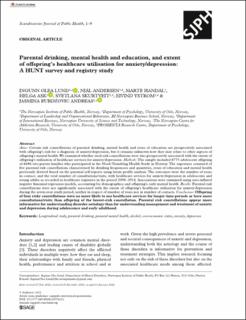| dc.contributor.author | Lund, Ingunn Olea | |
| dc.contributor.author | Andersen, Njål | |
| dc.contributor.author | Handal, Marte | |
| dc.contributor.author | Ask, Helga | |
| dc.contributor.author | Skurtveit, Svetlana Ondrasova | |
| dc.contributor.author | Ystrøm, Eivind | |
| dc.contributor.author | Burdzovic, Jasmina | |
| dc.date.accessioned | 2022-08-08T08:15:08Z | |
| dc.date.available | 2022-08-08T08:15:08Z | |
| dc.date.created | 2022-03-25T13:12:30Z | |
| dc.date.issued | 2022 | |
| dc.identifier.citation | Scandinavian journal of public health, Online First March 24 2022 | en_US |
| dc.identifier.issn | 1403-4948 | |
| dc.identifier.uri | https://hdl.handle.net/11250/3010533 | |
| dc.description.abstract | Aims: Certain risk constellations of parental drinking, mental health and years of education are prospectively associated with offspring’s risk for a diagnosis of anxiety/depression, but it remains unknown how they may relate to other aspects of offspring’s mental health. We examined whether such risk constellations were also prospectively associated with the extent of offspring’s utilisation of healthcare services for anxiety/depression. Methods: The sample included 8773 adolescent offspring of 6696 two-parent families who participated in the Nord-Trøndelag Health Study in Norway. The exposures consisted of five parental risk constellations characterised by drinking frequencies and quantities, years of education and mental health previously derived based on the parental self-reports using latent profile analysis. The outcomes were the number of years in contact, and the total number of consultations/visits, with healthcare services for anxiety/depression in adolescents and young adults as recorded in healthcare registries in the period 2008–2014. Associations were examined using zero-inflated negative binomial regression models, accounting for demographics and offspring’s early mental health. Results: Parental risk constellations were not significantly associated with the extent of offspring’s healthcare utilisation for anxiety/depression during the seven-year study period, neither in respect of number of years nor in number of contacts. Conclusions: Offspring of four risky constellations were no more likely to use healthcare services for longer time periods or have more consultations/visits than offspring of the lowest-risk constellation. Parental risk constellations appear more informative for understanding disorder aetiology than for understanding management and treatment of anxiety and depression during adolescence and early adulthood. | en_US |
| dc.description.abstract | Parental drinking, mental health and education, and extent of offspring’s healthcare utilisation for anxiety/depression: A HUNT survey and registry study | en_US |
| dc.language.iso | eng | en_US |
| dc.publisher | Sage | en_US |
| dc.rights | Navngivelse-Ikkekommersiell 4.0 Internasjonal | * |
| dc.rights.uri | http://creativecommons.org/licenses/by-nc/4.0/deed.no | * |
| dc.subject | Longitudinal study | en_US |
| dc.subject | parental drinking | en_US |
| dc.subject | parental mental health | en_US |
| dc.subject | alcohol | en_US |
| dc.subject | socio-economic status | en_US |
| dc.subject | anxiety | en_US |
| dc.subject | depression | en_US |
| dc.title | Parental drinking, mental health and education, and extent of offspring’s healthcare utilisation for anxiety/depression: A HUNT survey and registry study | en_US |
| dc.title.alternative | Parental drinking, mental health and education, and extent of offspring’s healthcare utilisation for anxiety/depression: A HUNT survey and registry study | en_US |
| dc.type | Peer reviewed | en_US |
| dc.type | Journal article | en_US |
| dc.description.version | publishedVersion | en_US |
| dc.rights.holder | The Authors | en_US |
| dc.source.journal | Scandinavian Journal of Public Health | en_US |
| dc.identifier.doi | 10.1177/14034948221076212 | |
| dc.identifier.cristin | 2012571 | |
| cristin.ispublished | true | |
| cristin.fulltext | original | |
| cristin.qualitycode | 1 | |

